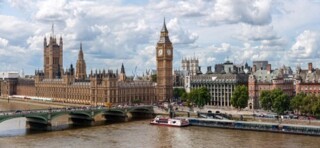Parliamentary Roadshow
Bernard Porter
The Palace of Westminster is crumbling. It will require £3 billion to restore it. I’ve never been very fond of the building architecturally, and it wasn’t popular when it was built – least of all among MPs, who complained of the stink it let in from the Thames – but familiarity often breeds acceptance, and the silhouette has become so iconic that of course the place needs to be put back into shape. Whether or not that’s worth splashing out three billion for, when there are so many other worthy causes to hand, such as bailing out banks, is for taxpayers – or rather the chancellor – to decide.
Another question is what to do with MPs while the job is being done. They could stay there, I suppose, while the work goes on around them; but anyone who’s had builders in will know the inconveniences of that.
There’s a golden opportunity here: the fabric of the palace isn’t the only thing that’s crumbling. The reputation of those who work in it is, too. That may have reached crisis point, with decreasing turnouts in successive elections and the current extraordinary success of an essentially anti-politics party. Ukip may have been founded on right-wing xenophobia, and be led by public school bankers, but it’s beginning to beat more populist, traditionally left-wing drums: against big business, NHS privatisation and the like. I don’t want to make too much of the analogy, but this is the way Nazism gained its mass support: nationalism plus ‘socialism’, against a background of widespread disillusion with ‘old’ politics.
Ukip is gentler than that, a soft-ball version of the fascist game. But a common factor, which it also shares with other new or growing parties in Europe – the Sverige Demokraterna, for example, or the Front National in France, or Italy’s Five Star Movement, together with the Tea Party in the United States – is its anti-establishment politics. In Britain it has been fed by the expenses and other scandals, various cover-ups (those paedophile files), Parliament’s perceived powerlessness in the face of Brussels and big business, the rise of consumerism and press cynicism; but a powerful component is the idea that politicians no longer relate to the electorate. They’re not ‘ordinary people’ any more. Tories are all Bullingdon Boys (they aren’t, but that’s the image), and Labour MPs are professional politicians since their student union days, who have never done a proper job in their lives. (Except the former postman Alan Johnson, who has ruled himself out for the Labour leadership; and Tristram Hunt, who has been a university lecturer. Yes, that is a proper job.) In a literal sense, most of them are no longer our representatives.
Aggravating this is their geographical distance from most people, in the bubble of privilege in the south-east of England known as London and the ‘home’ counties, with a totally different economic trajectory from the rest of the country – house prices are rising there, for example; they’re still stagnant here in Hull – and a general disdain for ‘provincials’. (I also realise that the south isn’t all soft: many areas of London, for example; the part of Essex where I grew up; towns like Rochester; the far south-west.)
At the time of the Scottish independence referendum many of us in the north empathised strongly with the Scots’ contempt for Westminster, while at the same time hoping they would vote No so that we wouldn’t be left alone, even more under the Westminster establishment’s thrall. If Scotland had voted for independence we might have asked to join it. (How about a new national boundary from the Mersey to the Humber?)
One way of dealing with the alienation might be to insist that prospective MPs have done a ‘proper job’ for at least ten years before offering themselves to the electorate. (I’d exclude ‘public relations’ from the list of acceptable jobs, but maybe that’s just me.)
Another, however, might be to take advantage of the Palace of Westminster’s imminent overhaul to evacuate it and move Parliament around, like the Cup Final while Wembley was being rebuilt. Peripatetic parliaments or king’s councils are not unprecedented. We had them in the early Middle Ages. Other countries still do. That way MPs could re-engage directly with the parts of Britain that feel distanced from Westminster today.
Meeting one year in Manchester, the next in Glasgow (not Edinburgh, given the local competition), another in Swansea, then in Newcastle or even Hull (UK City of Culture in 2017), they would see the shuttered-up shops, the desolation caused by deindustrialisation, as well as the many positive and promising aspects of provincial life. And national journalists would follow them, and report. I’m sure they could find enough big rooms to meet and debate in – even some that might remind them of their old home, such as Manchester Town Hall (a much better building than the Palace of Westminster). Getting away from London for a while could do Britain’s crumbling democracy a power of good. What’s to lose?

Comments
Parliament on Tour sounds like a great idea. Imagine the boost to the local fine dining and rental property markets.
It's just as well that you didn't let loose with the analogy with the Nazi Party's rise in Germany because it doesn't fit. The Nazis were a minor regional party until the collapse of the economy in 1929. Their policy consisted of bashing the Socialists and claiming that Hitler was the only hope. There are some characters in European parliaments who think that the Nazis were too harshly treated and that they had some good ideas. Liga Nord, the FN in France, the Wilders cavalcade in Holland are all closet fascists, not to mention the Hungarian conservatives. They all seem like good reasons to stay out of national politics.